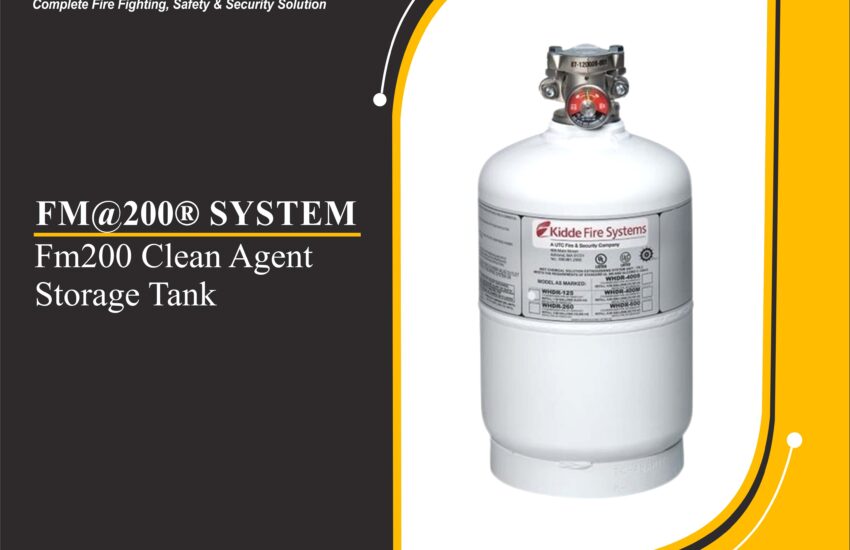FM200 Clean Agent Storage Tank is a high-pressure container used to store FM200 fire suppression gas (HFC-227ea) in a clean agent fire suppression system. It plays a critical role in safely storing and discharging the fire suppressant during an emergency. FM200 is a non-toxic, colorless, and odorless gas widely used in data centers, control rooms, server farms, and critical infrastructure where water-based suppression is not viable.
Key Features of FM200 Storage Cylinders
- High-pressure seamless steel or welded construction
- Pre-filled with FM200 (HFC-227ea) agent
- Equipped with a discharge valve and siphon tube
- Pressure-tested and certified to international standards
- Pressure gauge for constant monitoring
- Capacity options ranging from 10 lbs to 1,200 lbs or more
- Can be connected in banked systems for large coverage areas
How FM200 Clean Agent Storage Tanks Work
- Storage: The tank securely stores the FM200 gas under pressure, usually around 360 psi (25 bar) at 21°C.
- Activation: Upon fire detection, the fire suppression control panel sends a signal to open the solenoid valve or mechanical actuator.
- Discharge: The FM200 gas is released through connected piping and nozzles to flood the protected area.
- Fire Suppression: The agent interrupts the chemical reaction of the fire, extinguishing it in less than 10 seconds without leaving any residue.
Advantages of FM200 Storage Tanks
- Space-saving design for compact areas
- Fast discharge time – typically within 10 seconds
- No residue, water, or damage to electronics
- Safe for human occupancy in properly designed concentrations
- Environmentally friendly with zero ozone depletion potential
- Long storage life without deterioration
Applications of FM200 Clean Agent Cylinders
- Data centers and server rooms
- Electrical switch rooms
- Telecom facilities
- Archives and museums
- Medical equipment rooms
- Control centers
- Industrial equipment enclosures
Types and Sizes of FM200 Clean Agent Storage Tanks
| Cylinder Size | Agent Capacity | Approx. Coverage Area |
|---|---|---|
| 10 lbs (4.5 kg) | Small enclosures | Up to 50 ft² |
| 100 lbs (45 kg) | Medium rooms | Up to 500 ft² |
| 600 lbs (272 kg) | Large rooms | Up to 3,000 ft² |
| 1,200 lbs (544 kg) | Multi-zone system | Up to 6,000 ft² |
Installation & Maintenance of FM200 Storage Tanks
Installation Guidelines:
- Must be installed by certified fire protection professionals
- Positioned upright and secured to avoid movement
- Located close to the protected area for rapid discharge
- Integrated with a control panel, piping network, and nozzles
- Pressure-relief and safety valves must be accessible
Maintenance Checklist:
- Monthly inspection for pressure, signs of leakage, or damage
- Semi-annual testing of cylinder pressure and valve integrity
- Hydrostatic testing every 5 years (as per NFPA 2001)
- Replace or refill after discharge or if pressure drops below limits
FM200 Storage Tank Standards & Certifications
- NFPA 2001 – Clean Agent Fire Extinguishing Systems
- ISO 14520 – Gaseous Fire-extinguishing Systems
- UL Listed / FM Approved
- Compliant with local fire safety codes and regulations
FM200 Clean Agent Storage Tank Price
The cost of FM200 cylinders varies based on:
- Capacity (lbs or kg)
- Brand and manufacturer
- Included accessories (valves, actuators, gauges)
- Location and shipping
- System design requirements
Estimated price range: $400 – $4,500 per cylinder (not including piping and installation)
Trusted Brands for FM200 Storage Cylinders
- Kidde
- Tyco
- Siemens
- Minimax
- Fike
- Amerex
- Firetrace
Conclusion
An FM200 clean agent storage tank is a vital component in modern fire suppression systems, especially for environments where equipment sensitivity and uptime are critical. Choosing the right size, ensuring correct installation, and performing routine maintenance ensures rapid response and long-term fire safety compliance. Always work with certified professionals and ensure components are UL listed or FM approved for reliability and safety.


